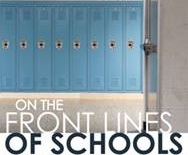If you thought what you saw over the past few days was frustrating, just wait for what the next two months have in store. The fiscal cliff bill passed last night only delays the impact of the fiscal cliff. There’s no doubt that many people are concerned about what the incoming Congress will decide on a number of issues–including education. I’ve compiled a list of pieces on the fiscal cliffs impact on education below:
- Education Services and Special Education Cuts are at Stake
American Federation of Teachers president Randi Weingarten summed the problem up best, noting that, “Kicking the can down the road for two months means that we still face the possibility of staggering and debilitating cuts to public schools, health care and services that our kids and families count on.”
Indeed, a looming $1.2 billion cut to Title I funding alone will reduce or eliminate education services for over 1.7 million low income children and federal special education funding could still be slashed by $1 billion, eliminating support for 536,000 students and resulting in 12,000 special education teachers and paraprofessionals losing their jobs. That means school districts still face significant financial uncertainty as they make budgets for the 2013-2014 school year.” Read more: GOOD’s Why the Fiscal Cliff Deal Doesn’t Solve our Education Crisis.
2. Early Childhood Education on the Chopping Block
“If the sequestration cuts do end up going through in March, most school districts wouldn’t feel the pinch until the start of the 2013-14 school year, because of the way that key programs, such as Title I grants for districts and special education aid, are funded. That gives districts a planning window to figure out how to implement the cuts without hurting student achievement—and it gives Congress and the Obama administration more time to work out a deal.
But other programs, such as the Head Start preschool program for low-income children, which is administered by the U.S. Department of Health and Human Services, would be cut right away. And the impact-aid program would feel the sequestration sting in April, when districts receive their next payments. That program helps districts with a large federal presence, such as a military base.” Read about this and more on Ed Weekly: K-12 Aid Faces Uncertain Future, Despite ‘Fiscal Cliff’ Deal
3. Higher Education Saved
The final agreement to avoid certain tax increases and spending cuts passed both houses of Congress late Tuesday, staving off several measures that would have raised the tax bill for college students and potentially deprived universities of critical research funding.
The deal to avert the so-called “fiscal cliff”spared the American Opportunity Tax Credit and extended the measure for five years, EdWeek reports. Born of the 2009 stimulus bill, the American Opportunity Tax Credit allows middle- and low-income families a tax deduction of up to $2,500 a year in education expenses for four years. It can trim the overall cost of a college degree by $10,000. Read more on The Huffington Post: Fiscal Cliff Deal Spares Higher Education Research Funding, Tuition Tax Credit
I’m glad higher education was spared. I hope that K-12 comes out victorious when the final legislation is passed in two months. Call your representatives and let them know to save education! Our nation’s future depends on our ability to educate our children today.









